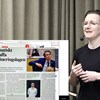disputed
David Miller: Boundaries, Democracy and Territory
Professor David Miller, Nuffield College at the University of Oxford. ABSTRACT The paper I will be presenting asks the general question ‘What boundaries between political units ought there to be?’ Reje
Excluding Citizens: Belongership and the Constitutional Demos in British Overseas Territories
Ethnopolitics Abstract Previous literature explains the fact that sub-national elections tend to be more inclusive than national elections by reference to the level of the election. This paper argues th
Katharina Berndt Rasmussen: Bridging Gaps - A Theory of Discrimination
Venue: Institutet för framtidsstudier, Holländargatan 13, 4th floor, Stockholm, or online. Research seminar with Katharina Berndt Rasmussen, PhD. in Philosophy.Register here >Abstract Disputes about d

Katharina Berndt Rasmussen: Bridging Gaps - A Theory of Discrimination
Research seminar with Katharina Berndt Rasmussen, PhD. in Philosophy. Disputes about discrimination surface time and again in the public debate: Is there such a thing as ”reverse discrimination” or ”S
Richard Bellamy: Taking Back Control: Why National Democracy Needs the EU, and the EU Needs National Democracy
Richard Bellamy, Professor of Political Science, UCL and Director of the Max Weber Programme, EUI. Visiting Professor at the University of Exeter. Abstract The muted popular support for, and certain faiI dispute this analysis. I argue that the EU’s role consists of supporting the democratic institutions of the member states, not least by enabling them to regulate their mutual interactions in non-dominating ways. From this perspective, the standard solution to the EU’s democratic deficit would create a domestic democratic deficit within each of the member states, one I contend democracy at the EU level would be unable to compensate for. Indeed, the current rise in Euro scepticism can be regarded as a product of this situation. By contrast, I suggest we conceive the EU as an association of democratic states, the decisions of which are under their joint and equal control. Drawing on the book, the talk will cover why such an arrangement is necessary, the norms that govern it, and the institutional framework required for it to work effectively and efficiently as well as equitably.
Do we need dual-process theory to understand implicit bias? A study of the nature of implicit bias against Muslims
in: Poetics AbstractPsychological dual-process theory has become increasingly popular among sociologists. The dual-process framework accounts for two types of thinking; a fast, associative, automatic o
On revolutions
Palgrave Communications, volume 6, Article number: 4 (2020). doi.org/10.1057/s41599-019-0371-1 Abstract Sometimes the normal course of events is disrupted by a particularly swift and profound change. His
On Revolutions
Working Paper SERIES 2018:63 THE VARIETIES OF DEMOCRACY INSTITUTE, University of Gothenburg, Dept of Political Science. Abstract Sometimes the normal course of events is disrupted by a particularly swif
John A. Ferejohn: Political Economy and Immigration: A Seven Nation Study
John A. Ferejohn, Professor of Law, New York University School of Law Abstract In many advanced democracies the major political parties have been disrupted either by the rise of new (populist) parties o
The Oxford Handbook of Population Ethics - Interview with the editors
If we can affect how many people will be born in the future, what does that mean for our decisions today? Would it be bad if much fewer people would exist in the future, as an adaption to climate chan








